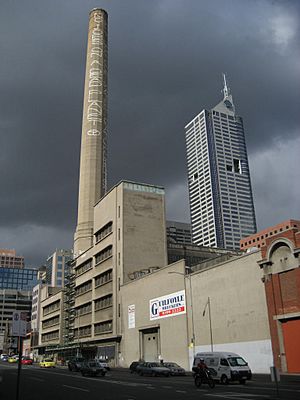Spencer Street Power Station facts for kids
Quick facts for kids Spencer Street Power Station |
|
|---|---|

The power station undergoing demolition in 2007
|
|
| Country | Victoria, Australia |
| Location | Spencer Street, Melbourne, |
| Coordinates | 37°48′53″S 144°57′12″E / 37.81472°S 144.95333°E |
| Status | Closed & Demolished |
| Commission date | 1892 |
| Decommission date | 1982 |
The Spencer Street Power Station was an old power plant in central Melbourne, Australia. It used coal and later oil to make electricity. The station opened in 1892. It provided power to homes and businesses in the city. It also sold electricity to other local power companies.
In 1941, the State Electricity Commission of Victoria took over its management. By the 1960s, the station could produce 109 megawatts of power. However, it was only used when electricity demand was very high. The power station closed in 1982 because it was no longer needed. People thought it looked bad, so it was torn down between 2006 and 2008.
Contents
History of the Spencer Street Power Station
The City of Melbourne built the Spencer Street Power Station. They wanted to supply electricity to the city. Arthur James Arnot was in charge of designing and managing the power station from 1894 to 1901.
How the First Power Plant Worked
The first part of the power station had 24 General Electric direct current (DC) generators. These generators were grouped into four sets of six. Each set was powered by a large 300-horsepower steam engine. These engines used steam from four Babcock & Wilcox boilers.
The electricity produced was 3,000 volts DC. It was used for street lights, trams, lifts, and city buildings. In 1897, four 75-kilowatt alternators were added. These made alternating current (AC) at 2,000 volts and 72 hertz. By 1900, a powerful 2,500-horsepower steam engine was installed. It was connected to a 120-kilowatt alternator. This AC power was sent to nearby suburbs using transformers.
More additions came in 1905. These included a 200-kilowatt alternator and four 350-kilowatt DC generators. These new generators helped increase the city's power supply. Four more Babcock boilers were added to make the needed steam.
Expanding Power Generation
In 1907, the first turbines were installed. These were two 750-kilowatt machines that made 4,400 volts of single-phase electric power. The old arc lighting equipment was removed to make space for them. In 1908, three more steam engines were added. Each was connected to a 750-kilowatt generator. More boilers were also installed.
A large Siemens alternator was added in 1913. It could produce 4.4 megawatts of three-phase electricity at 6,600 volts. The next year, two 5-megawatt turbo-alternators were installed. In 1917, another 6.5-megawatt turbo-alternator was added. It also produced three-phase power at 6,600 volts.
By 1927, four more 6-megawatt turbo-alternators were installed. At this time, all the old DC generators were replaced with newer motor-generators. By 1923, the station had 20 Babcock water tube boilers. Each boiler could produce 17,000 pounds of steam per hour. The smoke went into two tall chimneys, each 175 feet high.
Later Additions and Management
In 1949, two 15-megawatt turbines were installed in a nearby area. These used steam from large oil-fired boilers. Ten years later, two 30-megawatt machines were added. This section was called "C station." These new boilers could burn coal powder. However, to reduce air pollution, they were only used with oil.
In 1941, the State Electricity Commission of Victoria took over the power station. It became part of the state's main electricity network. Over time, upgrades increased the station's power capacity to 109 megawatts by the 1960s. But newer, larger power stations were built in the Latrobe Valley. This meant the Spencer Street station was only used during times of very high electricity demand.
Why the Power Station Was Demolished
After closing in 1982, the power station sat empty for many years. In 2003, a man was arrested for painting a message on the chimney. In 2004, a girl sadly died after falling inside the building.
In May 2006, the site was sold for $7.6 million. Work began soon after to remove asbestos and tear down the building. This cleared the way for new development. The historic tower was taken apart starting in September 2007. The entire site was cleared by April 2008.
Images for kids
 | Calvin Brent |
 | Walter T. Bailey |
 | Martha Cassell Thompson |
 | Alberta Jeannette Cassell |



